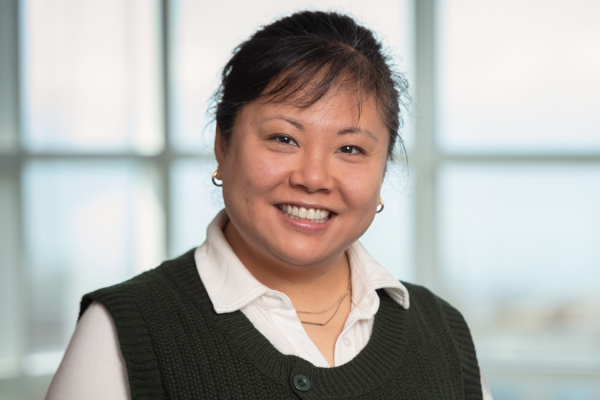
From Student to Faculty: Laura Cang Brings Passion for Learning and Community
Laura Cang is one of the newest additions to the Computer Science teaching faculty—and a natural fit for the department. After earning an undergraduate degree in mathematics and completing UBC's Bachelor of Education program, Laura spent time teaching high school math and working in the insurance industry. But something was missing.
"I wanted to make stuff—to build something," she explained.
That desire led her to UBC's Bachelor of Computer Science (BCS) program, a second-degree pathway designed for students with prior academic backgrounds to transition into computing. Laura originally intended to complete the program and pursue a career in tech, but her path shifted after she had the opportunity to engage in graduate research.
As a graduate student, Laura worked with Professor Karon MacLean in the field of human-computer interaction (HCI), focusing on how machines can recognize human emotions through touch. While completing her PhD, she began teaching undergraduate cognitive systems and computer science courses—and rediscovered her passion for teaching.
"I enjoy being with students. Teaching is an opportunity to mentor and get to know them. Introductory courses can spark imagination. It's a formative period that can influence beyond one generation."
As she neared the completion of her PhD, applying for a permanent teaching faculty position felt like the right next step. The role aligns perfectly with her interests in teaching and student development, and her research on emotional expression and its effects on learning.
In her new role, Laura joins the department as an educational leadership faculty member, where the focus is on teaching excellence and student engagement, with room for pedagogical research. She plans to continue exploring computer science education as a research area.
"There are stages of learning—from the struggle to the 'aha' moment. Feeling the struggle is part of learning, and I want to understand and help with that process. CS demands a lot from students, and I am looking for ways to support them, even beyond the classroom."
Laura maintains a positive outlook on the learning process, even as the landscape evolves. With the shift toward online and remote learning, she emphasizes that the heart of education remains unchanged.
"Students have always learned and worked remotely—we've always expected and intended for 'homework' and practice to be done outside of classrooms. Learning takes time to process, so education has always happened in many places. I think of the classroom as a co-located learning hub that helps guide the process. And learning can be so much more fun in a community—we won't lose that."
On the topic of artificial intelligence in education, Laura is optimistic about its potential.
"We're still discovering the benefits and drawbacks of AI and where it should fit into our workflows. I am eager to have AI take on some of the more tedious tasks, but for the education space, I'm wary of when AI use might end up offloading the joy and satisfaction of learning. AI cannot replace the community or the struggle that makes learning meaningful."
Although she has worked in other cities and had many options, Laura chose to stay at UBC.
"Vancouver is wonderful. I always liked coming back. And UBC is a world-class institution with a welcoming, supportive atmosphere. I've always loved UBC's motto—Tuum Est (It is yours). To me it means: it's your path to choose, supported by a community that helps people grow, especially in the computer science department."
With her interdisciplinary background, commitment to education, and thoughtful insights, Laura brings valuable experience and energy to the department. She's sure to have a lasting impact on students transitioning into university and into the world of computing.
Welcome, Laura. We're so glad you chose to stay.